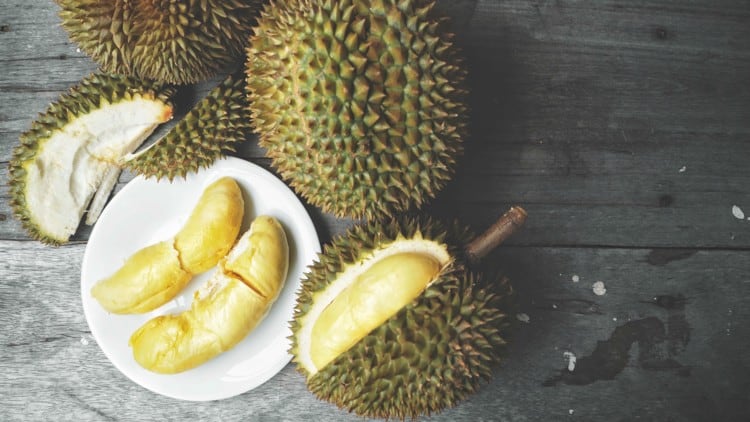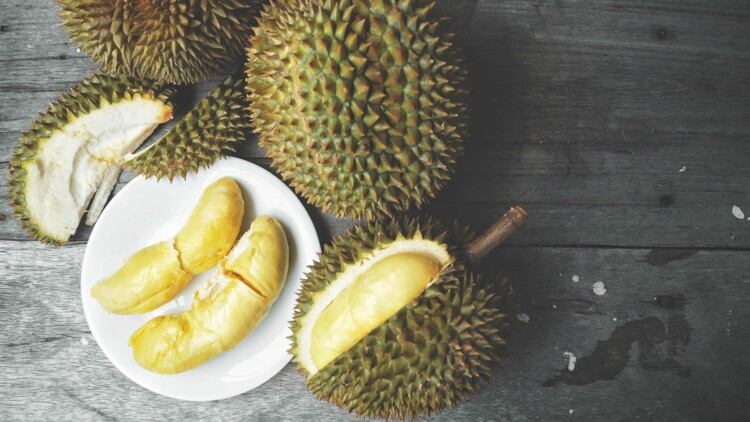According to data from the Ministry of Agriculture and Rural Affairs of the People’s Republic of China, the country imported some US$963mn or 358,000 tons of durian in the first half of 2019, more than doubling both in value and volume from 2018.
The majority of durian imports so far have been from Thailand, but after Malaysia secured an export deal in August 2018 for whole frozen durians, the tides look to be slowly but surely turning in its favour, particularly when concerning China’s favourite durian variant, the famed Musang King which could reach over US$100 per fruit in the country.
China’s incessant demand for durian has not only driven prices up, but also led to real estate experts predicting that durian plantations will invoke a boost in local agricultural land value in the coming year.
“[The demand for durian plantations means that] smaller parcels of land [in Malaysia] have also attracted wide interest from durian planters supporting an anticipated up-tick in values [in 2020],” said Savills Malaysia Managing Director Datuk Paul Khong in a public statement.
Major local plantation companies are also getting in on the game: Traditionally oil-palm focused PLS Plantations, for example, has also turned its attention to planting durian, announcing the acquisition of 69.63 acres of land dedicated to durian cultivation in November 2019.
According to The Edge, the purchase cost PLS Plantations some RM20mn (US$4.89mn) in cash, but also caused its share prices to leap by almost 35% in two weeks from RM0.66 (US$0.16) to RM0.89 (US$0.22) per share.
The firm already has deals with four Shanghai-based China fruit distributors to export durian products over, and the durian varieties that the firm intends to focus on include the ever-popular Musang King, Black Thorn and D24.
Malaysia sent over its first shipment of whole durian fruits to China in June last year (previously only frozen pulp and paste was allowed), and the country’s Ministry of Agriculture and Agro-based Industry (MOA) previously released a statement predicting that sales to China would reach some 22,000 tonnes by 2030.
That said, despite the massive economic opportunities durian could afford for Malaysia, the enormous quantities required to satisfy demands from China’s 1.4 billion-strong population brings with it some concerns as well.
Two of the most major areas of debate are the magnitude of environmental effects this will bring, as well as the impacts on local indigenous populations.
At present, Malaysia already grows some 300,000 tonnes of the fruit yearly, but rising demand means that much more will be required, which is highly likely to lead to increased deforestation to make way for plantations.
With high-yield varieties still a long way off, growing demand has led to increased deforestation to make way for durian plantations.
“[The situation is] very serious. […] Now that China wants more of our durians, Malaysians are going crazy because there is so much money to be made,” Association for the Protection of the Natural Heritage of Malaysia (PEKA) President Puan Sri Shariffa Sabrina Syed Akil told China Dialogue.
‘[The authorities are] more than happy to open up our forests […] because they can make more money from the logging. […] The entire ecosystem is affected. The rivers are gone.”
Indigenous community representative Mustafa Along, chairman of the Kelantan Network of Orang Asli Villages, also claimed at an international forum that indigenous people were losing ancestral lands to these plantations, and protests were met with ‘legal action’, ‘intimidation’ and ‘violence’ by authorities.
MOA has however insisted that plantation growth will proceed ‘slowly’, and that farmers were being encouraged to use existing orchards instead of clearing more land.
"Deforestation for new areas is not encouraged," MOA Minister Salahuddin Ayub told AFP.
Virus concerns
Despite the recent novel coronavirus (COVID-19) concerns that have arisen in China lately, Malaysia remains optimistic that demand for its durian will not be threatened, so much so that it is targeting over 60% in growth this year.
“We are popular for Musang King durian that we export to China. [At present] the time of the coronavirus outbreak is not the Musang King season, so for now it has not caused any effect [on export to China]," Federal Agricultural Marketing Authority (FAMA) Chairman Ishak Ismail said at a launch event earlier this month.
“I’m confident and believe the demand for Musang King is extraordinary [even with the virus outbreak] and the price there is very attractive when compared [with the price] here at RM40 to RM90 per kg, but we can sell at RM200 to RM400 per kg there.”
FAMA is targeting RM50mn (US$12.1mn) worth of Musang King exports to China this year, a 67% increase from RM30mn (US$7.2mn) last year.
This is despite reports that the price of the highest grade Musang King durians have already dropped from RM60 (US$14.50) per kg to RM30 per kg since the viral outbreak and orders from China supposedly 'dropped to zero' due to many cities being quarantined, according to CNA.
That said, Pahang Fruit Farmers' Association Chairman Melissa Yap added that the industry should remain optimistic as 'the Chinese people love durians'.
“The peak season for durian is from April to August, so hopefully by then the virus would have been controlled,” she said, adding that the fruits can be stored in liquid nitrogen freezers for up to two years to maintain freshness.
Troubling times ahead?
With the rise of Malaysia’s durian industry as well as virus concerns in China, trouble also looks to lie ahead for Thailand, currently the largest exporter of durians to China at almost 40% overall.
According to research from the TMB Bank Economic Research Centre, over the past four years Thai durian exports have grown an average of 37.3% and maintained its position as the world’s largest exporter of the fruit – but various problems prevent it from achieving its ‘full potential’.
“Thai businesses still have vulnerabilities in accessing the Chinese market, such as market conditions and prices. China also has rules, such that any business that wants to sell products online on Chinese websites need to have a Chinese bank account,” said TMB.
“This means that many Thai entrepreneurs and exporters need to rely on foreigners to join or invest to gain access to the export and online market in China.”
China also implemented GMP requirements for Thai durians entering the country in 2018, leading to severe challenges for many growers and exporters.
Finished products
The appeal of the Chinese durian industry is so great that even non-durian producing countries such as Singapore have an eye on it, adding their own unique value by attempting to market finished durian products to China.
Speaking to The Straits Times at the China International Import Expo (CIIE) in 2019, Singapore-based durian firm Four Seasons Durians Director Joyce Wang said that it was possible to ‘customise’ their durian products to fit the tastes of Chinese consumers.
“Once the Chinese try, they will know these are different from the durians they have,” she said.
Four Seasons Durians specialises in durian-based bakery items such as cakes, pastries and mooncakes, and also produces spreads, candies, ice-cream and more.
The firm also went viral online for its new restaurant serving durian hotpot, basically a combination of Musang King durian in chicken soup. Many consumers claimed that the durian flesh which disintegrated into the soup gave it a richer, sweeter taste.
The restaurant is located at Singapore Changi Airport’s co-located shopping mall Jewel, and durian hotpot has been a well-known – and loved – dish in China for some time now, so the appeal for tourists is clear.
All in all, despite the challenges that lie ahead, the economical value and appeal of the durian market in China appear to be significantly attractive enough to outstrip any risks, and as such the country is likely to remain a major import destination for durian-producing countries worldwide.




